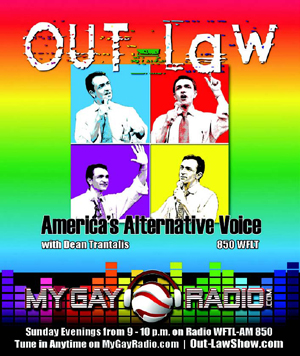Alex Vaughn
A perception is a judgement and every minority – and, by token, the majority – has been labelled. We see a particular person and make a judgement, about who they are, where they are from, what they do and how they think all from a set of benchmarks we have either been taught or have compiled from experience.
Recent statistics have shown that acceptance of the gay community is on the rise and coming into a clear majority. But, when you get down to the nitty-gritty, you have to ask how much have perceptions changed?
Over the course of many years, there have been cruel and unfounded beliefs about the community, that gay people are pedophiles or disease carriers. HIV/AIDS was initially dubbed ‘the gay cancer’ only affecting gay men. It was seen as ONLY a gay disease. As education has evolved, so too have perceptions. Most of us now understand HIV/AIDS does not discriminate against gender or sexual orientation.
As understanding has developed, so too has acceptance. Times have undoubtedly changed and one could perceive that perceptions of the community have not only changed, but have evolved into the positive.
However, if we look a little deeper we can see that for every change there are still areas in which gay people are hugely discriminated against, even though there is scientific evidence and statistics to the contrary.
One example: Statistics show that heterosexual men are more prone to pedophilia than gay men, and a lot of the ‘evidence’ that people used to support the idea gay men were pedophiles was what people referred to as ‘sexually deviant behavior’. Even though
evidence is now clear that pedophilia is rife in the heterosexual community, people still see gays as perverts and deviants.
In addition, just this week a straight man was turned away from a blood bank for looking ‘too gay’. There is still a FDA ban on gay men donating blood. In the early stages before HIV/AIDS could be determined with a blood test, the fear was that a gay HIV-positive male could infect a blood supply. Fine. However, as we have moved on in our knowledge, before you now donate blood, tests for HIV/AIDS are mandatory for ANYONE donating blood. This fact has led activists – and even The Red Cross – to argue that the ban is clearly ‘medically and scientifically unwarranted’. If the ban was lifted, it is estimated it would add 200,000 pints of blood to the national supply.
The fact that it hasn’t been lifted shows in my mind that the reason to keep it – if it is ‘medically and scientifically unwarranted’ – is simply due to the fact that perceptions towards gay men have not changed and that the social stigma of the fear of the 1980’s has not dissipated as much as we would like to think.
Globally, when we talk about America, we mean Miami, New York, Boston, Seattle, LA, San Francisco, Washington D.C. and Fort Lauderdale to name but a few as meccas for the gay community, but those are just cities, they are not the majority of the USA. On the whole, however, these cities and others are, in effect, the parenthesis to the USA. The majority of the center and south is where the community still needs the proverbial makeover – where perceptions still need to be severely worked on to ensure that people see us as not only equal but, most importantly, not a threat.
Whilst writing this and thinking about perception, I can’t help but notice that in the community we have a considerable ‘perception PR’ issue. We look at subsets of the community without equality and judge swiftly. The stylish are arrogant, the slovenly considered junkies, the skinny must be meth heads or diseased, the fat are lazy and so on and so forth – and that’s not even getting into the mine field of gays vs. lesbians or gays and lesbians vs. transgendered. It’s odd, really; we work to get others to accept us because we offer the image that the LGBT and even Q is a uniquely dynamic and unified community. If we turn around, sadly we would see that our true perceptions of ourselves are not exactly what we project. Maybe we need to change the perceptions we have of each other, the fact we still call fellow gay men ‘her’ or ‘she’ or ‘faggot’ surely can’t help the cause!
Then, of course, we can’t forget the media, TV and movies have undoubtedly continued to lead people’s view of the gay community with their still stereotypical gay best friend, or the nympho or the lesbian who goes to Home Depot. On one hand, for comedic purposes one has to ask how harmful is it? Well, to someone who is educated about the community, it’s not. But if you are still trying to show people equality and change the perception that not every gay man sounds like he is on helium, is bouncing from boyfriend to boyfriend and has a penchant for jazz hands, then perhaps those less stereotypical need to stand forward.
Stereotypes come from somewhere and they do exist, but there is a great deal of people in the LGBT community who don’t fit the mold and, ironically, they can really help the cause of enhancing and clarifying others’ perceptions of the community as a whole.
However, you would never know them – they aren’t at gay pride, or the bars, or circuit parties or clubs. They aren’t in malls working behind the perfume counters. They are the bankers, lawyers, waiters, tech guys and the like who have adapted into society without flair or scene, but are happy to have a life unburdened with the fight. In a way, that is what the fight is for:normality. To be left in peace and treated equally, yet they are perceived by their own community as hiding and ashamed.
Maybe; maybe not.
The fight goes on for equality and for the future, and that is necessary and will be a long one but, as individuals, you can check yourself. Before you let your perceptions of others lead you to judge and dismiss, remember someone is doing the same to you right now!
If the doors of perception were cleansed everything would appear to man as it is, infinite. – William Blake
Alex Vaughn is the Editor-in-Chief of the Florida Agenda. He can be reached at editor@FloridaAgenda.com




